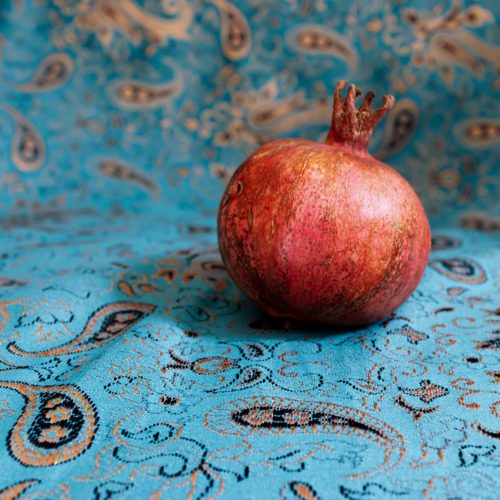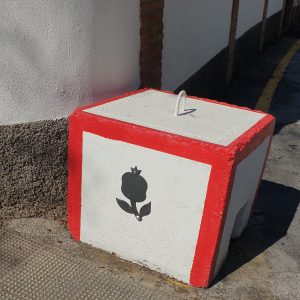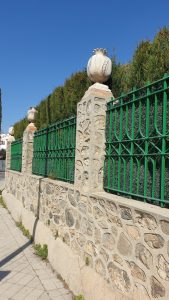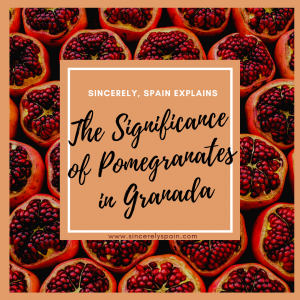
The Signficance of Pomegranates in Granada
 Dear Hanna,
Dear Hanna,
As you know, Granada is a very special city to us. It’s the place we have each called home for many years at a time. However, did you know that even just the name ‘Granada’ is special? Unlike most cities across Spain, ‘Granada’ has meaning outside of the city’s name. Granada is the Spanish term for pomegranate and so the tasty fruit is a popular symbol for the city. As you may imagine, there’s a lot more history and folklore behind this symbol than immediately meets the eye. That’s why today we wanted to dig a little deeper into the significance of the pomegranate in Granada’s history and culture.
Where can you see the granada in Granada?
Pomegranates are everywhere in Granada! If you’re not actively looking for them, they’re easy to miss, but as soon as you start to notice them you won’t be able to stop. Walk through any neighborhood of Granada for just ten minutes and you’re sure to find granadas on street signs, plaques, bollards, and even manhole covers. You’ll likely find them embossed into the cement of building walls, worked into wrought iron fencing, and otherwise added for decoration on both public and private property. Once you realize that the pomegranate is a symbol of Granada, the omnipresence of the fruit in the city’s artwork, ornamentation, and many souvenirs makes a lot of sense.
 Why is the pomegranate the symbol of Granada?
Why is the pomegranate the symbol of Granada?
The most common explanation is that the Reyes católicos (the Catholic Kings) are responsible. According to the stories, King Ferdinand and Queen Isabella chose the fruit as a symbol of their final victory over the Moors of Al-Andalus, which took place in Granada. Since then, the pomegranate has remained on the coat of arms of the city (which also features on the flag of Granada).
However, it’s important to note that the pomegranate has been abundant in this region of Spain since as early as the eighth century BC. The fruit is originally from Iran and Afghanistan, but was brought to Spain by the Phoecians, who first settled in Cadíz (another Andalusian city) in 850 BC.
It’s impossible to pin down exactly when pomegranates made their way into the granadino ecosystem but it’s safe to say that pomegranate trees, or granados, would have been present long before the Reyes católicos arrived. As such, it’s possible that any of the civilizations before the Catholic Monarchs could have also used the local fruit to name the city. Perhaps, it’s even more likely.
 What is the significance of the pomegranate in general?
What is the significance of the pomegranate in general?
The pomegranate is a particularly interesting fruit because it’s been present in many cultures and world religions, carrying a variety of meanings depending on who you ask. To name a few, the pomegranate is said to signify life and rebirth in Greek Mythology. In countries of the Middle East where the fruit originally comes from, the pomegranate is a symbol of fertility, abundance, and marriage.
The Koran is said to claim pomegranates can purge hatred and envy. While mentions in the Holy Scriptures suggest the pomegranate could have been the real “forbidden fruit” in the story of Adam and Eve. In the Buddhist tradition, the pomegranate is one of the three blessed fruits (alongside citrus and peach) and is known for curing evil habits. A final example of the pomegranate’s significance is the belief that each fruit contains exactly 613 seeds in keeping with the 613 commandments of the Torah, making the pomegranate a sacred fruit in accordance with this sacred number.
As you can see, many world religions have a connection to the pomegranate and, seeing as Granada and Spain in general has been home to practitioners of most of these faiths, any of the beliefs or legends could have had an effect on the significance of this fruit in the city to this day.
 What other reasons are there to love pomegranates?
What other reasons are there to love pomegranates?
On a less mystical level, the pomegranate proves important due to its vast health benefits. In the past and today, the granada is known as a ‘superfood’ due to its antioxidant properties which prevent (or at least delay) cell damage. Additionally, pomegranates are rich in other nutrients like fiber, vitamin C, and vitamin K. The fruit is also viewed as effective at curing gastroenterological ailments through Ayurvedic medical science.
Especially if you will be in Granada during pomegranate season (late fall and winter), you’re going to want to try this tasty fruit! While you may find it included in dishes when eating out, we recommend purchasing your own at a local frutería (green grocer) or farmer’s market in order to dig in yourself. Because it’s a local fruit, you’ll find that granadas are really not expensive in Spain, especially during high season.
You may be surprised to find that many of the pomegranates indigenous to Granada are not the deep red that you may be used to but are actually a more subdued pink color, proving far less dangerous in terms of staining fingers and clothes but just as tasty.
Are you a fan of pomegranates? Were you aware of this strong connection Granada has to the fruit? We’d love to hear about your thoughts and experiences in the comments below!
Sincerely,
Spain
 Resources:
Resources:
https://www.britannica.com/place/Granada-Spain
https://tomaandcoe.com/blog/pondering-pomegranates/
https://www.ncbi.nlm.nih.gov/pmc/articles/PMC1118911/#B6
https://www.visit-andalucia.com/phoenician-expansion-andalucia/
https://www.everydayhealth.com/diet-nutrition/diet/pomegranates-nutrition-health-benefits-how-eat-more/





2 Comments
Sonali Roy
Thanks for your article. Very well written.
Our recent visit to Andalucía, Spain made me curious about this fruit. Although I’m from India living in Ireland,and I have known this fruit since my childhood, I didn’t know about the significance of the fruit in Granada until we visited there. Unfortunately, we didn’t get a chance to try the fruit in Granada. But we wish to visit there again, not just for pomegranate but for the amazing history and culture of Andalucía.
Warm regards,
Sonali
Sincerely, Spain
Thank you for your lovely comment, Sonali. We’re glad to hear you found the article useful. Andalucía is such a beautiful place to visit and we must agree that it’s not necessarily a bad thing to have a reason to return one day!